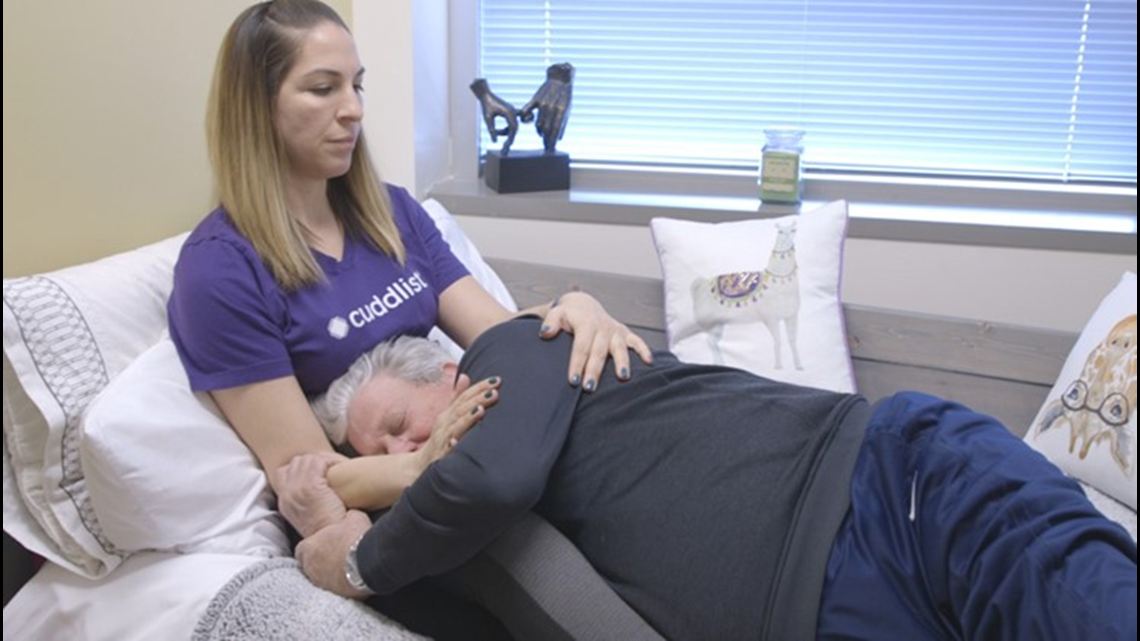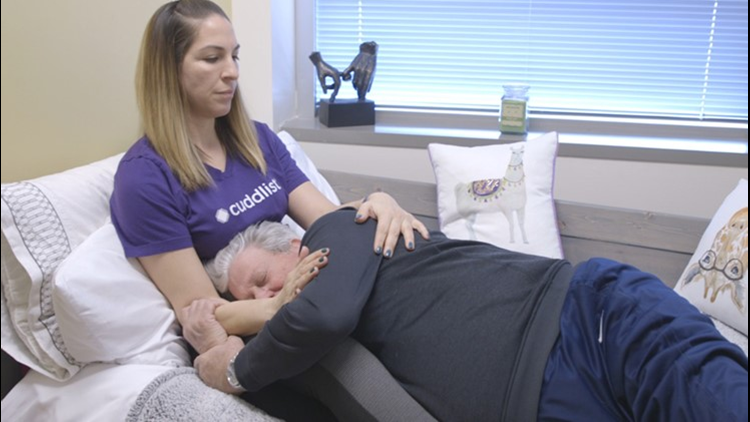Author: Adrianna Rodríguez
Published: 6:16 PM EST February 7, 2019
Updated: 8:22 PM EST February 7, 2019
You cuddle your dog. You cuddle your pillow. You cuddle your children and your significant other. But some people cuddle for a living and can make as much as $100 an hour.
Professional cuddling is gaining popularity among experts in therapy who say that human touch is a comfort that cannot be replaced by traditional therapy methods.
“So many of us are lacking in basic human connection,” said Adam Lippin, Co-Founder and CEO of Cuddlist. “Real people get real benefit from it.”
Cuddlist employs hundreds of professional cuddlers across the country who are booked by clients looking for a therapeutic cuddle session. Its website says that sessions are $80, but the price depends on the cuddler.
Jasmine Siemon is a professional cuddler based out of the Washington, D.C. area and has been cuddling for three years. She charges $100 per hour-long session and $800 for overnight sessions, during which she devotes 12 hours to a client – six hours awake and six hours asleep.
In addition to helping her clients sift through issues in their personal lives, Siemon said the work is also very fulfilling.
“You’re also getting a lot of benefit because you’re helping somebody making huge leaps and bounds, finding themselves, dealing with trauma and other kinds of issues,” Seimon said.
Siemon said that clients book her sessions for all kinds of reasons. Some of her clients are lonely, maybe just getting out of a divorce or haven’t been in the dating pool for a while. Other clients of hers have disabilities or conditions that seem to become more manageable with her sessions.
“Some people come from trauma, from PTSD from combat overseas or PTSD from childhood trauma,” Siemon said. “Some clients have degenerative diseases such as Parkinson’s and ALS.”


Lippin and Siemon also suggested that cuddling sessions are more than just making clients feel relaxed and at ease. In many ways, the sessions also teach clients about consent, which they say is especially important in the midst of the #MeToo movement.
“Most men don’t want to be creeps, they just don’t know how to not be creeps,” said Lippin. “We hear men saying they’re just learning. These are learned behaviors.”
Siemon believes that the most important component to this learned behavior is understanding and establishing strong boundaries. She said both are vital to having a healthy relationship, not only between cuddler and client, but in any relationship in life.
“If you don’t hold strong boundaries for yourself and for the session for your clients, it’s easy for things to get skewed,” Siemon said.
She starts implementing those boundaries early on with a client. Even before the first session, she emailsan agreement and waiver, and they participate in a video chat and conversation.
“Clients will sometimes push boundaries,” Siemon said. “I don’t believe it’s with the intention of seeing what they can get away with. I believe it’s in the moment.”
Although Siemon was at first cautious about the stigma of being a professional cuddler, she quickly learned that there was a community of cuddlers that supported her throughout the process. She came out of the “cuddle closet” a year ago and has found resounding success in her part-time business. She added that her friends and family quickly adapted to the idea, and it has become a normal part of her everyday life.
Siemon advised those who are interested in pursuing a profession in cuddling to do their research and make sure they’re doing it for the right reasons.
“You’re not doing it just because you like to hug or the fast money,” she said. “The people who come into it like that are the ones who are more susceptible to having their boundaries pushed and perhaps [don’t] have the tools to hold those strong boundaries.”
She hopes that in the future, professional cuddling becomes a more widely accepted and discussed method of therapy.


